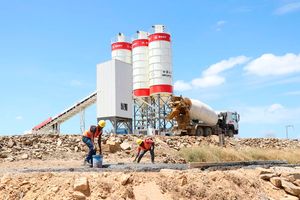
National Land Commission Chairperson Gershom Otachi.
Key national government infrastructure agencies owe landowners Sh56 billion in unpaid compensation that has yet to be remitted to the National Land Commission (NLC).
The development comes as MPs say they will draft a law to compel the national government to first compensate landowners before acquiring their land.
The billions owed by six agencies are meant to compensate landowners who surrendered their land for 123 multi-billion shilling projects currently being rolled out across the country.
Appearing before the Senate Committee on Roads and Transport, NLC Chairperson Gershom Otachi told senators that “most of these projects whose funds have not been received by the Commission have since been completed.” However, the NLC is yet to receive the Sh56 billion for onward payment to project-affected persons (Paps).
He said the non-remittance of the billions was a major impediment to the payment of Kenyans whose land was taken by the national government for the development of the capital infrastructure projects.
The agencies include the Kenya National Highways Authority (KeNHA), Kenya Urban Roads Authority (Kura), Kenya Rural Roads Authority (KeRRA), Kenya Ports Authority, Kenya Airports Authority and Kenya Railways Corporation.
KeNHA owes the most, with Sh43 billion yet to be remitted, Kenya Railways Sh11 billion, Kura Sh1.2 billion and Kerra Sh500 million.
Some of the projects include the Nairobi Expressway road project, Kibwezi-Mutomo road, James Gichuru-Rironi road, Kenol-Sagana-Marua road, Nairobi Western Bypass road and Mombasa Gate Bridge.
Mr Otachi told the committee, chaired by Kiambu Senator Karungo Thangwa, that Kenha is yet to remit Sh10.32 billion to compensate landowners for the Nairobi Expressway road project.
Another Sh2.39 billion is owed to landowners for the Kenol-Sagana-Marua road project, Sh2.2 billion for the James Gichuru-Rironi road project, Sh1.58 billion for the Kibwezi-Mutomo road and Sh1.34 billion for the Nairobi Western Bypass road project.
He said the six agencies had so far released Sh83.4 billion to affected landowners for compensation, of which the commission had disbursed Sh79.62 billion, representing over 95 percent of the funds received.
Mr Otachi, however, admitted that they are yet to pay Sh3.95 billion to landowners but explained that the payments are at various stages of processing, adding that payment is a continuous process.
He said the Commission has always compensated affected landowners whose funds have been received from acquiring entities within the shortest possible time, except for outstanding legal and administrative challenges that delay payment.
These challenges include ownership disputes, land inheritance cases, ongoing court cases and incomplete or unavailable documentation on the affected land and/or persons.
He also pointed to budgetary constraints as an obstacle to speedy compensation, as money has to be budgeted first, depending on the availability of funds.
“The Commission is continuously engaging the project-affected persons and other stakeholders, including the use of alternative dispute resolution mechanisms, with the aim of resolving the disputes,” he said.
Mr Otachi was responding to concerns from the committee as to why the agency was yet to pay out all the money it had received from the acquiring entities.
“Why does the government come to people’s land, value it and acquire the same yet delay to compensate them? This is now becoming a curse and not a blessing to the landowners,” said Kitui Senator Enoch Wambua.
“I am depressed because the people of Kiambu have not been paid since 2018. Will you compensate them at the current market value?” asked Mr Thang’wa.
But the NLC chairperson said due diligence, including an ongoing survey of the land, must be carried out before any compensation money can be released by the commission.
Read: Compensation of those displaced by construction of Horn of Africa Gateway Development project halted
But Mr Wambua argued that the Constitution calls for prompt compensation but landowners wait for years to receive their compensation.
“Prompt payment has steps that have to be followed. It is not like the Commission has money just lying idle somewhere. This money has to come from the acquiring entities which also have to receive the same from the National Treasury,” said Mr Otachi.
He further pointed out that the acquiring agencies only release money with specific instructions on who is to be paid, citing specific plot numbers, as opposed to basing the payments on where construction has already taken place.
“Maybe Parliament can tell the agencies to give money in a blanket form for payment to anyone cleared to be paid,” Mr Otachi said.









